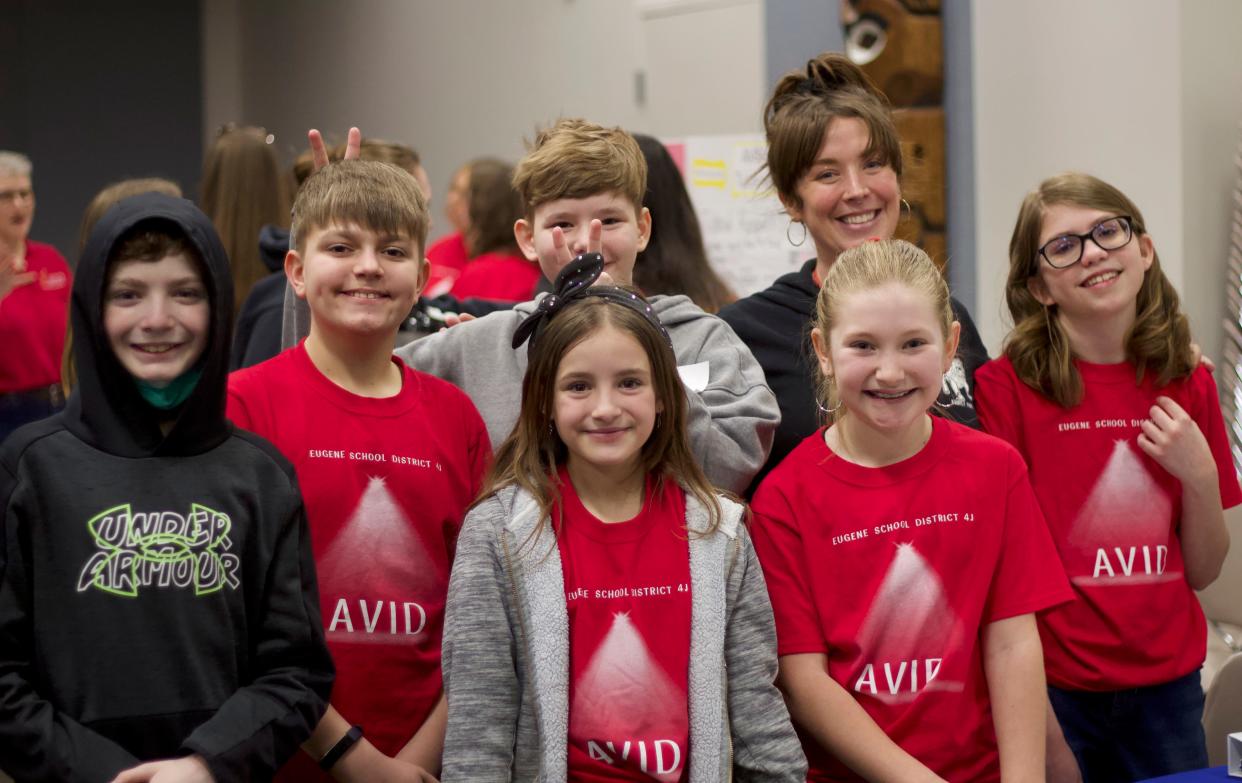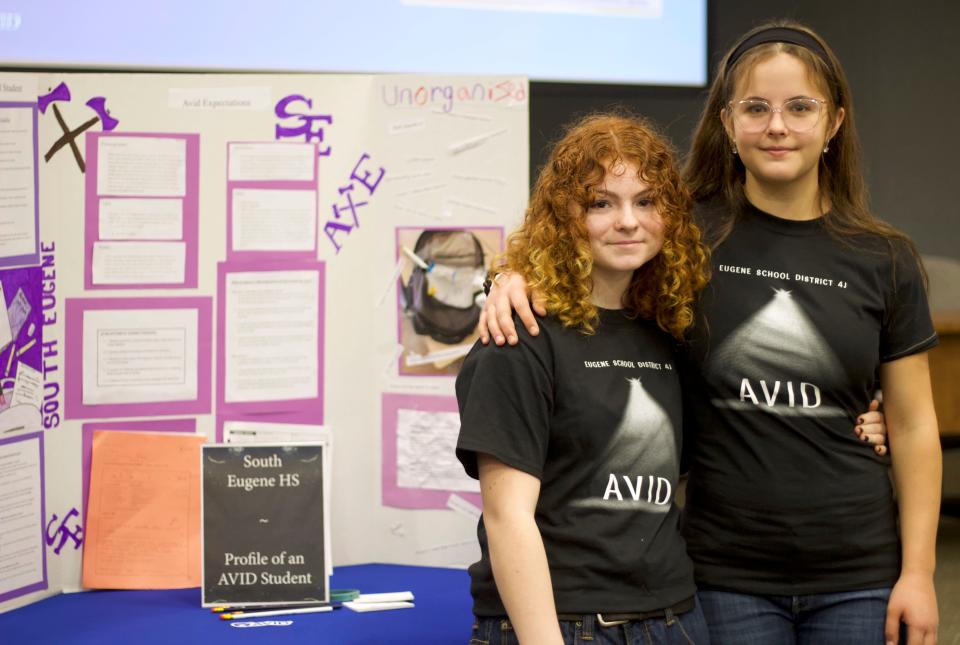What is AVID? Learn about the ever-expanding college and career readiness program

Eugene School District 4J hosted an AVID explainer event last week, shedding light on the popular college and career readiness program and how it equips academically promising but potentially disadvantaged students with essential life skills.
While the term AVID is familiar in educational settings, not everyone is acquainted with the program's specifics and its significance for participating students.
"AVID is a college and career readiness program that teaches exceptional students academic learning skills so that all kids can be successful regardless of their post-secondary path," said Laura Queirolo, 4J's AVID co-director and an AVID elective teacher at South Eugene High.
AVID, which stands for Advancement Via Individual Determination, prepares students for success in school and beyond.
"These are the tools that you need for school," said Greg Borgerding, 4J's AVID co-director and 4J director of secondary education. "Like, your lunchbox serves a purpose — it's what you put your lunch in. AVID is the tool that you use so that you can be successful in everything that you do at school. It gives you note-taking skills, organizational skills, reading and writing skills, communication skills."
Although often targeted at historically disadvantaged groups, such as students of color and those with low income, AVID is not an intervention program. Borgerding emphasized their motto: "acceleration, not remediation."
"A typical AVID student is in the academic middle," Queirolo said. "They're students who have a high potential that they might not necessarily be meeting just yet ... They may also have some kind of an adverse barrier in their outside situation that might make going to college or pursuing a career path particularly challenging."
These students are identified as having the potential to excel with a little added support.
Identifying as having the potential to excel with added support, AVID students frequently enroll in Advanced Placement or International Baccalaureate courses. Nationally, 98% of AVID students graduate from high school, and 93% complete four-year college entrance requirements.
"Students who are in the AVID elective, tend to be far less likely to engage in substance abuse, they engage in less risk-taking behaviors," Queirolo added.
What does AVID look like in practice?
AVID has been a part of 4J since 2008, starting at South Eugene High School. Today, all four of 4J's traditional high schools, all eight middle schools and six elementary schools have AVID programs. There are over 8,000 schools nationwide that have adopted the program.
The program looks very different depending on what grade it's implemented in.
For middle and high schools, AVID is an optional elective. Students who are considered good candidates may be extended and invitation to apply, then must go through an application process to be accepted. Students must demonstrate that they are willing to take on the rigorous work of being in AVID.
Because AVID is an elective at the secondary level, Borgerding said parents will sometimes ask why some kids get to participate while others don't. Borgerding explained that AVID strategies are being used throughout the school.
"They use strategies that is well known to engage kids in the classroom," Borgerding said. "All teachers will learn these (AVID) strategies and use them with kids in their regular classroom. But the AVID class is a select group of kids that have applied so they can go intense and deep Within by sacrificing an elective so that they can have a cohort experience."
Borgerding also said the elective offers the added benefit of creating a tight-knit cohort of students that stays together throughout high school. Some have even been in the same class since elementary school.
AVID elementary
At the elementary school level, AVID is fully implemented school-wide. Every teacher receives AVID training and integrates its strategies into daily lessons. Some students may not even realize they are part of an AVID school.
Common lessons at the elementary level are organization — such as how to use and sort binders, how to keep a planner — setting and achieving goals, time management, and problem-solving.
Students begin keeping binders in third grade. Conner Johnstun, a fifth grader, is now a pro. He showed off his binder, explaining the different sections. He also demonstrated his classmates' planner's and calendars to keep track of assignments and events.

"It keeps my stuff really organized," Johnstun said. I always know where it is."
Marie Rose, a third grade teacher at Awbrey Pary Elementary, which has been using AVID since around 2016, said they have "game days" with "games" such as Socratic seminars. Rose said the students love it.
All lessons tie into five key traits at the elementary level: writing, inquiry, collaboration, organization, and reading.
"It's the good stuff," Rose said. "The kids enjoy it. It's engaging, it's naturally differentiated. It's all the things that you're already doing as a teacher, it's just kind of highlighting. In everything we do, we're going to write, we're going to ask questions, we're going to collaborate, we're going to be organized."
AVID is continuing to expand in 4J. Borgerding hopes in the next few years, the rest of 4J elementary schools will have implemented AVID. Charlemagne French Immersion Elementary School is next to begin AVID, with teachers to go through summer training and begin implementing in the 2024-25 school year.
"We're fortunate that 4J has prioritized AVID in their funding priorities," Queirolo said. "The more we grow it, the bigger the demand becomes.
"Who doesn't want their student to be self sufficient and successful?"
Student support systems
Piper Everts and Josie Campbell have been in AVID together since they were in seventh grade at Spencer Butte. Now sophomores at South Eugene High, Everts and Campbell have grown alongside their peers, forming a strong community.
"I've grown with the class that I have. I love everyone in my class," Campbell said. "Each year and every day I'm in AVID, I learn more about what I might want to do when I'm older."
Although students are not required to stay in AVID throughout their school career, but once they're in, they stay in the same cohort and don't need to reapply. If a student transfers in from another AVID school, even out-of-state, they don't need to apply, they would automatically be fit into an AVID cohort.

The pair gave a shoutout to their AVID teacher Kenny Koberstein, who they said supports them in all aspects of their life.
Both Everts and Campbell want to pursue a career in the medical field. Campbell said she wants to attend the University of Washington and become a traveling nurse. Thanks to Koberstein's guidance, they both already have been admitted to summer medical programs this year.
AVID allows students to explore different higher education and career pathways, from teaching students about trade professions to having them complete projects on different colleges.
Everts named other valuable lessons they use daily, such as how to properly take notes, how to write a professional email, how to work in a team and basic financial literacy.
"AVID isn't a good fit for everyone," Campbell said. "Some people just don't go to their classes, so they just wouldn't be good for it. But I think everyone should try it out and just at least apply for it."
Miranda Cyr reports on education for The Register-Guard. You can contact her at mcyr@registerguard.com or find her on Twitter @mirandabcyr.
This article originally appeared on Register-Guard: What is AVID? 4J staff and students explain the "toolbox" for learning

